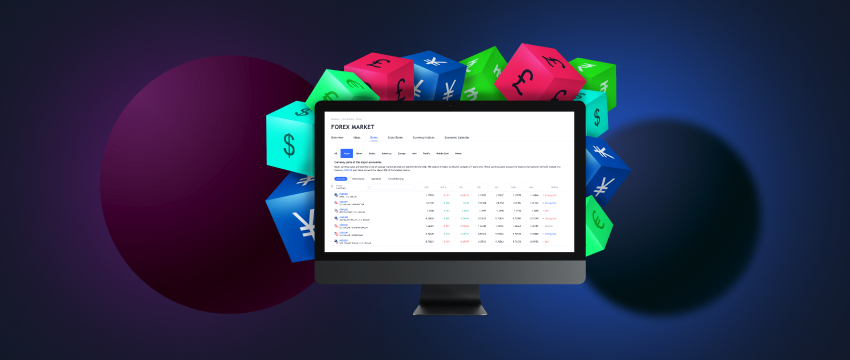Financial markets play a crucial role in global economies, enabling individuals and institutions to trade a variety of financial instruments. This includes stocks, bonds, commodities, currencies, derivatives, etc. These markets facilitate the flow of capital and provide a pricing mechanism for assets, reflecting supply and demand dynamics.
Financial markets provide opportunities for investors to grow their wealth through buying and selling financial assets based on their investment goals, risk tolerance, and profit objectives. In this blog, we’ll delve more into the financial markets, as well as different tradeable instruments, shedding some light on their important characteristics, functions and factors that drive prices.

Types of financial markets
There are many different types of financial markets that exist. This includes the stock market, bond market, forex, commodities, real estate, and several others.
Stock market
Stock markets are exchanges or platforms where the shares of publicly owned companies are bought, sold or issued. Companies typically use a stock market to raise capital by issuing stocks which are divided into shares. Investors can purchase these shares, effectively becoming owners of the company with the potential to make gains from dividend payments.
The cổ phiếu are typically listed on public exchanges through a lengthy and highly regulated fund-raising process called Initial Public Offering (IPO), in which the company is scrutinised in depth by regulators. Stock prices are typically determined by various factors like the company’s financial performance, industry trends, economic conditions, investor sentiment, and supply and demand. Some of the most popular stock markets in the world are the New York Stock Exchange, Nasdaq, London Stock Exchange, Shanghai Stock Exchange, Euronext, and the Japan Stock Exchange.
Bond market
The bond market is a financial market where participants buy and sell debt securities, primarily bonds. Governments may issue bonds to raise capital to reduce debt or fund infrastructural projects and developments. Publicly traded companies may also issue bonds to finance growth projects or continue operations. There are different types of bonds in the market.
This includes government bonds, municipal bonds, corporate bonds, or international bonds. Each type has its own characteristics like interest rates, credit ratings, maturities, and risk levels. Government bonds are usually considered safer investments being they’re backed by the government. Corporate bonds are considered to carry higher risk but may also offer higher potential returns.

Forex market
The foreign exchange (forex) market facilitates the currency trade. It is the largest financial market in the world, and in 2020 the global forex market was valued at $2.4 quadrillion. It is a relatively new market in comparison to others, and also one of the fastest markets worldwide, with trillions of dollars’ worth of trades happening every minute.
The forex market is however one of the most volatile markets globally, with huge amounts of money gained and lost in seconds so risk management is key. There are various factors that drive price fluctuations in the forex market. Aside from sheer supply and demand, other variables include economic announcements or news, geopolitical events (e.g., civil unrest, war), international trade, market or investor sentiment, and even environmental disasters.
Commodities market
The commodities market is where traders and investors go to buy and sell commodities (raw materials or primary products) like gold, wheat, oil, meat, etc. Commodities are usually categorised into hard commodities or soft commodities.
| Hard commodities (natural resources) | Soft commodities (agricultural products or livestock) |
| Gold Rubber Oil Metal ores Gas Silver Steel Iron Aluminium |
Beef Pork Wheat Coffee Sugar Avocados Cacao Soybeans |
Commodities are typically trades in spot markets (sometimes referred to as cash or physical needs), where buyers or sellers exchange physical commodities for immediate delivery, or in derivatives markets which involve futures, forwards, or options. Future or forwards are contracts whereby the owner acquires control of the underlying asset at a specific date in the future, but at a fee (price) agreed upon today. Main drivers of commodity prices are currency movements, geopolitical situations, supply and demand, and the economic growth or health of a country.
Real Estate market
One of the fundamental drivers of economic growth in the U.S. is the real estate market. In fact, the housing starts report released by the U.S. Census Bureau, is utilised as a key economic indicator. The report is comprised of data on new residential construction projects, including single family homes, apartment complexes, building permits, etc. The real estate market is impacted by several different factors globally. However, four primary factors are:
- Demographics: includes race, age, income, profession, gender, migration, population expansion, etc. When demographic shifts occur, real estate trends may be impacted for years.
- Lãi suất: probably has the biggest impact on the real estate market, pushing prices up or down. For example, higher interest rates typically mean higher mortgage rates, thereby reducing demand for real estate.
- The economy: the state of the economy affects the value of real estate as well. In other words, if a country’s economy slows down, so too does the real estate market typically.
- Legislation: government policies and subsidies can also impact property prices and demand. This includes tax credits, deductions, etc.

The fundamental function of the financial markets
All financial markets work in a similar fashion, that is to bring buyers and sellers together and enabling them to trade with one another. The core function of these markets is to allow for the free flow of capital and assets in a financial economy, thereby making the global economy operate more efficiently. If financial markets were not to exist, the flow of capital would be largely inefficient and vital economic activities like investments, commerce, and trade would be dramatically reduced.
T4Trade: Your Path to Successful Trading
T4Trade appeals to traders around the world for many reasons. This regulated broker offers the fastest possible execution of trades, a wide range of financial instruments across 6 asset classes, some of the lowest spreads and competitive pricing, and a high-quality 24/5 multilingual customer support team to provide you with all the assistance you may require.
Disclaimer: This material is for general informational & educational purposes only and should not be considered investment advice or an investment recommendation. T4Trade is not responsible for any data provided by third parties referenced or hyperlinked, in this communication.




